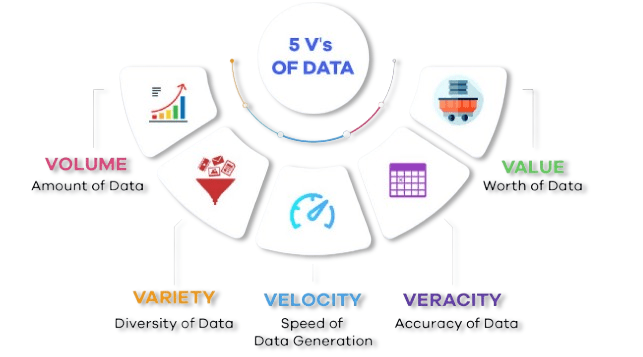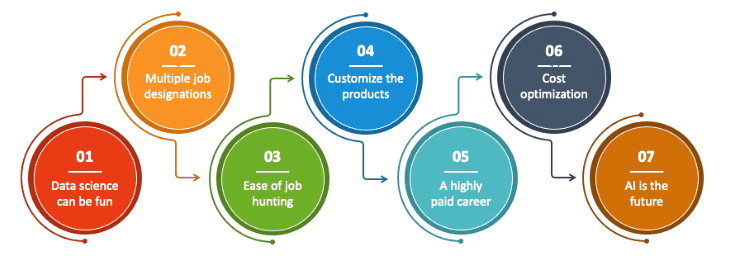
- Introduction to Big Data Science
- Skills Required for a Big Data Scientist
- Tools and Technologies in Big Data
- High-Paying Industries for Big Data Scientists
- Career Growth and Opportunities
- Certifications for Big Data Professionals
- Resume and Portfolio Tips
- Interview Preparation Strategies
Introduction to Big Data Science
Big Data Science is a rapidly growing field that analyzes and extracts meaningful insights from massive volumes of structured, semi-structured, and unstructured data. With the explosion of data from social media, e-commerce, IoT devices, and enterprise systems, businesses increasingly rely on data science to make data-driven decisions. Big Data Science combines statistical analysis, machine learning, and advanced data processing techniques to identify patterns, trends, and correlations, all of which are integral to Data Science Training. The core characteristics of big data include volume (large amounts of data), velocity (the speed at which data is generated and processed), variety (diverse data formats), veracity (data accuracy and reliability), and value (the actionable insights derived). This field is critical in finance, healthcare, retail, and technology, enabling them to optimize operations, enhance customer experiences, and gain a competitive edge.
Interested in Obtaining Your Data Science Certificate? View The Data Science Course Training Offered By ACTE Right Now!
Skills Required for a Big Data Scientist
Becoming a successful Big Data Scientist requires combining technical, analytical, and business skills. Proficiency in programming languages like Python, R, Scala, or Java is essential for data analysis and building machine learning models. Strong statistical and mathematical skills, including knowledge of linear algebra, probability, and regression analysis, are crucial for interpreting data accurately, especially when considering tools like Python vs R vs SAS. Experience with big data tools such as Apache Hadoop, Apache Spark, and data processing frameworks is highly valued. Cloud platform expertise in AWS, Azure, or Google Cloud is essential for large-scale data processing.

Additionally, skills in data visualization tools like Tableau, Power BI, and D3.js help in presenting insights effectively. Beyond technical expertise, problem-solving abilities, critical thinking, and business acumen are essential for identifying data-driven solutions. Practical communication skills are necessary to convey complex data findings to non-technical stakeholders.
Tools and Technologies in Big Data
- Apache Hadoop: A popular open-source framework for distributed storage and processing of large datasets. It allows for fault-tolerant, scalable data processing across clusters of computers.
- Apache Spark: A fast, in-memory data processing engine that enables real-time analytics and batch processing. It is widely used for big data applications due to its speed and ease of use compared to Hadoop MapReduce.
- NoSQL Databases: Tools like MongoDB, Cassandra, and HBase offer scalable and flexible storage solutions for big data. They allow for handling unstructured and semi-structured data more effectively than traditional relational databases.
- Apache Kafka: A distributed streaming platform for real-time data processing and messaging, Kafka is widely used for managing large-scale data streams, making it essential for big data architectures, much like What is Logistic Regression is crucial for binary classification tasks in data analysis.
- Hadoop Distributed File System (HDFS): A key component of Hadoop, HDFS is used to store large volumes of data across multiple machines in a distributed manner, ensuring fault tolerance.
- Data Lakes: Platforms like AWS S3 and Azure Data Lake store vast amounts of raw, unstructured data that can later be processed and analyzed.
- Business Intelligence (BI) Tools: Tools like Tableau, Power BI, and QlikView help in visualizing and analyzing large datasets, providing actionable insights for decision-making.
- Technology: The tech industry is one of the largest employers of Big Data Scientists, with companies like Google, Facebook, and Amazon offering high-paying positions for experts in data analytics, machine learning, and AI to drive innovation and optimize performance.
- Finance: Banks, investment firms, and fintech companies use Big Data for risk assessment, fraud detection, and algorithmic trading. With the complex nature of financial data, data scientists in this industry can command lucrative salaries.
- Healthcare: In healthcare, Big Data scientists analyze patient data, medical records, and clinical trials to improve treatment outcomes and enhance operational efficiency, using Top Python Libraries For Data Science like Pandas, NumPy, and Scikit-learn.
- Retail and E-commerce: Companies like Walmart and Shopify use Big Data for customer behavior analysis, inventory management, and personalized marketing. Big Data professionals in retail and e-commerce are highly valued and well-compensated.
- Government and Public Sector: Governments employ Big Data scientists to work on policy development, census data analysis, and national security, offering competitive salaries for data-driven decision-making.
- Telecommunications: Telecom companies leverage Big Data for network optimization, customer segmentation, and predictive maintenance. Data scientists in this industry enjoy attractive salary packages.
- Energy and Utilities: The energy sector uses Big Data for predictive maintenance, grid optimization, and energy consumption analysis. Big Data scientists working in this sector are compensated well for their expertise.
- Cloudera Certified Associate (CCA): The CCA certification focuses on the skills needed to work with Hadoop and Spark in real-world scenarios. It is ideal for those pursuing a career in Big Data analytics and data engineering.
- Google Cloud Professional Data Engineer: This certification validates the ability to design, build, operationalize, and secure data processing systems on Google Cloud Platform, focusing on Big Data solutions and machine learning.
- Microsoft Azure Data Engineer Associate: This certification demonstrates proficiency in managing and analyzing data using Azure’s Big Data and cloud-based services, such as Azure Data Lake and Azure SQL Database.
- AWS Certified Big Data – Specialty: Offered by Amazon Web Services, this certification assesses your ability to use AWS Big Data services for real-time processing, storage, and analytics at scale, highlighting Why Data Science Matters & How It Powers Business Value.
- Hortonworks Certified Apache Hadoop Developer: Hortonworks provides a certification for Hadoop developers, focusing on core concepts such as HDFS, MapReduce, and data processing frameworks like Hive and Pig.
- IBM Certified Data Scientist – Big Data: IBM’s certification focuses on Big Data management, machine learning, and data analysis using IBM tools, helping professionals gain expertise in large-scale data solutions.
- Certified Analytics Professional (CAP): The CAP certification covers a wide range of Big Data analytics skills, including data collection, analysis, and the application of analytical techniques to business problems.
To Earn Your Data Science Certification, Gain Insights From Leading Data Science Experts And Advance Your Career With ACTE’s Data Science Course Training Today!
High-Paying Industries for Big Data Scientists

Career Growth and Opportunities
A career in Big Data Science offers significant growth opportunities. At the entry level, professionals typically start as data analysts or prominent data engineers, focusing on cleaning, processing, and visualizing data. With experience, they can transition into mid-level roles such as data scientists or machine learning engineers, where they build predictive models and develop data-driven solutions, skills typically covered in Data Science Training. Senior-level roles include lead data scientists and architects overseeing large-scale projects and teams. With expertise and leadership skills, professionals can advance to executive roles such as Chief Data Officer (CDO), responsible for defining and executing data strategies at the organizational level. The demand for data science professionals is expected to grow, creating abundant career advancement opportunities and higher salaries.
Looking to Master Data Science? Discover the Data Science Masters Course Available at ACTE Now!
Certifications for Big Data Professionals
Resume and Portfolio Tips
When crafting your resume for Big Data roles, focus on showcasing your technical skills prominently. Highlight your proficiency in programming languages such as Python, R, and Java, as well as your experience with big data tools like Hadoop, Spark, and NoSQL databases. Certifications, such as those from Google Cloud or AWS, add further value to your profile. Don’t just list responsibilities; demonstrate specific achievements with quantifiable results, drawing on insights from Top Data Science Books for Beginners & Advanced Data Scientist. For example, mention how you optimized a machine learning model, improved data processing efficiency, or reduced processing time by a significant percentage. Your portfolio is crucial for Big Data roles include hands-on projects that highlight your practical skills. Be sure to detail the problem statement, the data processing techniques you used, and the outcomes of the project. Adding visualizations, and linking to live dashboards or GitHub repositories will reflect your ability to communicate complex data insights and demonstrate your technical creativity and expertise in handling large datasets.
Want to Get a Data Science Job? Check Out ACTE’s Data Science Interview Questions & Answer to Boost Your Preparation!
Interview Preparation Strategies
Preparing for a Big Data Science interview requires a balanced approach of technical and behavioral readiness. Start by reviewing key skills such as SQL, Python, and machine learning algorithms, as interviews often involve problem-solving and coding challenges. Be prepared to discuss how you would approach various technical tasks, such as cleaning messy datasets or optimizing machine learning models. Additionally, interviewers may ask about past projects, so be ready to explain the tools, techniques, and the business impact of your work, which are key components of Data Science Training. Make sure you understand the context and objectives of your previous projects, as this can demonstrate your practical expertise. Moreover, communication is crucial in a Big Data role. Practice conveying complex data insights in a clear, concise manner, especially when speaking with non-technical audiences. Interviewers often assess how effectively you can bridge the gap between technical data and actionable business insights.


